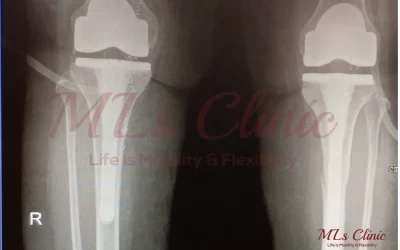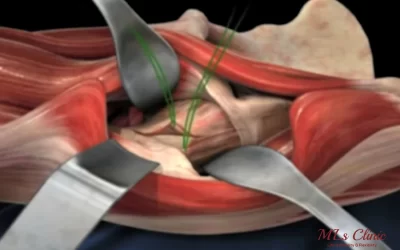Need a Knee Replacement? Which types of Knee Implants are right for you?

Knee injuries are another very common issue affecting millions of people worldwide. Whether it be arthritis, Age factor or any sports injury, knee surgeries have become the only common solution to gain the knee’s mobility back. Total Knee Replacement Surgery is one of the most famous knee surgeries performed worldwide, offering relief to those with severe knee conditions. However, one critical aspect of this knee surgery is selecting the best types of knee implants for you. In this blog Dr. Preetesh Choudhary, best knee replacement surgeon will guide you through how and which knee implants are the best choice for your needs.
What are Knee Implants?
Knee Implants are the artificial components that replace the damaged knee joints. These are used in Total or Partial knee Replacement Surgery. These implants are designed to mimic the natural movement of the knee while providing durability, flexibility and stability.
How to choose a knee implant?
Many people are confused about which types of knee implants would be best for them before getting knee replacement surgery. Here are a few factors that will help you select the best implant according to your medical condition-
- Age- Age plays a major role in selecting the knee implant, as a younger patient might need a more durable implant than that to an older patient.
- Activity Level- Selection of implant is also based on the amount of activity a patient performs. If he is into any high-impact activity or any contact sports then he will definitely need a better implant quality than that of an non-athlete.
- Degree of Knee Damage- If a patient has been to any trauma or accident then selection of implants also depends on the amount of knee damage.
- Bone Alignment- Due to different bone structure and alignment, selection of the implants vary from one patient to another. Not all types of knee implants can be adjusted to fit different types of bone structure.
- Knee Surgery- Every doctor’s way of performing a knee replacement surgery is different and therefore, selection of the best types of knee implants also varies according to the type of knee surgery performed.
With advancement in technology, modern types of knee implants are much better than the implants used before. They are more durable, more flexible and have improved longevity. Among the latest techniques, Robotic Total Knee Arthroplasty has emerged as a game-changer, offering precision and enhanced outcomes. Read more common Orthopaedic Questions & Answers.
Types of Knee Implants-
There are several types of knee implants available, each designed for specific needs of the patient. Here, we will discuss the most commonly used types of knee implants in partial and total knee replacement surgeries.
-
Fixed-Bearing Implants-
Fixed-bearing implants are the most common amongst the types of knee implants used in total knee replacement surgery. These knee implants feature a plastic insert that remains stationary between the metal components of the thigh bone (Femur) and shinbone (Tibia). These implants are used for patients with sedentary lifestyle or older individuals with low activity levels.
- Pros-
1) Long-lasting
2) Widely Used
3) Cheaper than the other implants
4) Suitable for most of the patients.
- Cons-
1) Less flexible in knee movement
2) May wear out faster in active individuals
-
Mobile-Bearing Implants-
In contrast to fixed-bearing implants, mobile-bearing implants have a rotating insert that allows a greater movement and flexibility to the knee. It is specially designed to reduce stress on the implant and provide better wear resistance. These implants are best for more active, younger and patients who require greater knee mobility.
- Pros-
1) Natural Knee Movement
2) Increased Knee Mobility
3) Increased Durability
4) Lesser risk of implant loosening
- Cons-
1) Expensive than fixed-bearing implant
2) Requires stronger ligaments to maintain stability
-
Posterior-Stabilized Implants-
These implants are designed for patients whose Posterior Cruciate Ligament (PCL) has been removed or damaged due to any medical condition before. They feature a special cam-and-post mechanism that compensates for the missing ligament. These implants are used in patients with severe Knee Arthritis and patients who require greater knee stability.
- Pros-
1) Provides greater stability
2) Allows more natural function
- Cons-
1) Wear out faster than other designs
2) Increased stress on surrounding muscles
-
Cruciate-Retaining Implants-
These implants are used when the Posterior Cruciate Ligament (PCL) is still intact and can be preserved. They help maintain the natural knee function by allowing the PCL to control knee motion. These implants are best for patients with strong and healthy knee ligaments and those who are undergoing Robotic Total Knee Arthroplasty.
- Pros-
1) Provides a more natural feel
2) Reduced wear and tear on the implant
- Cons-
1) Not suitable for the patients with weak or damaged ligaments.
2)Requires a precise surgical technique
-
Partial Knee Implants-
For the patients who have arthritis or damage in only one part of the knee, a partial knee replacement using unicompartmental implants may be an option. This procedure involves replacing only the damaged portion, preserving more of the natural knee structure. These implants are used for patients with localized knee arthritis and individuals seeking a quicker recovery.
- Pros-
1) Smaller incision
2) Faster recovery
3)Preserves natural knee movement
4) Less bone removal
- Cons-
1) May not be suitable for advanced arthritis
2)Possibility of needing a total knee replacement in the future
-
Custom Knee Implants-
Recent advancements in robotic total knee arthroplasty and 3D imaging have led to the development of custom knee implants. These implants are tailored specifically to the patient’s knee anatomy, ensuring a better fit and improved function. These Implants are best for patients with unique bone structures and those looking for a highly personalized knee replacement.
- Pros-
1)Perfectly matches the patient’s anatomy
2)Reduces implant loosening
3)Provides better knee function
- Cons-
1)Higher cost
2)Requires specialized surgical expertise
Why Choose MLs Clinic for Knee Replacement Surgery?
At MLs Clinic in Indore, patients receive world-class treatment for different types of knee injuries and knee surgeries. The clinic is equipped with the latest technology, ensuring high success rates in knee replacement surgeries. MLs Clinic is the best Joint Replacement and Sports Injury Clinic because-
- Expertise of Dr. Preetesh Choudhary, a leading sports injury surgeon
- State-of-the-art facilities for robotic total knee arthroplasty
- Personalized treatment plans for every patient
- Comprehensive rehabilitation and post-surgery care
If you are suffering from any kind of Knee Pain or Knee Injury then do not ignore these signs and book your appointment as soon as possible for the best medical guidance.
Conclusion-
Choosing the right type among the types of knee implants as well as the right doctor is a crucial step for a successful knee replacement surgery. With so many options available one must choose what is best for him wisely. Ignoring pain and symptoms will only worsen the situation by increasing the level of damage in the knee. Book an appointment with an Orthopaedic Doctor near you today and take your first step towards a pain-free life.






